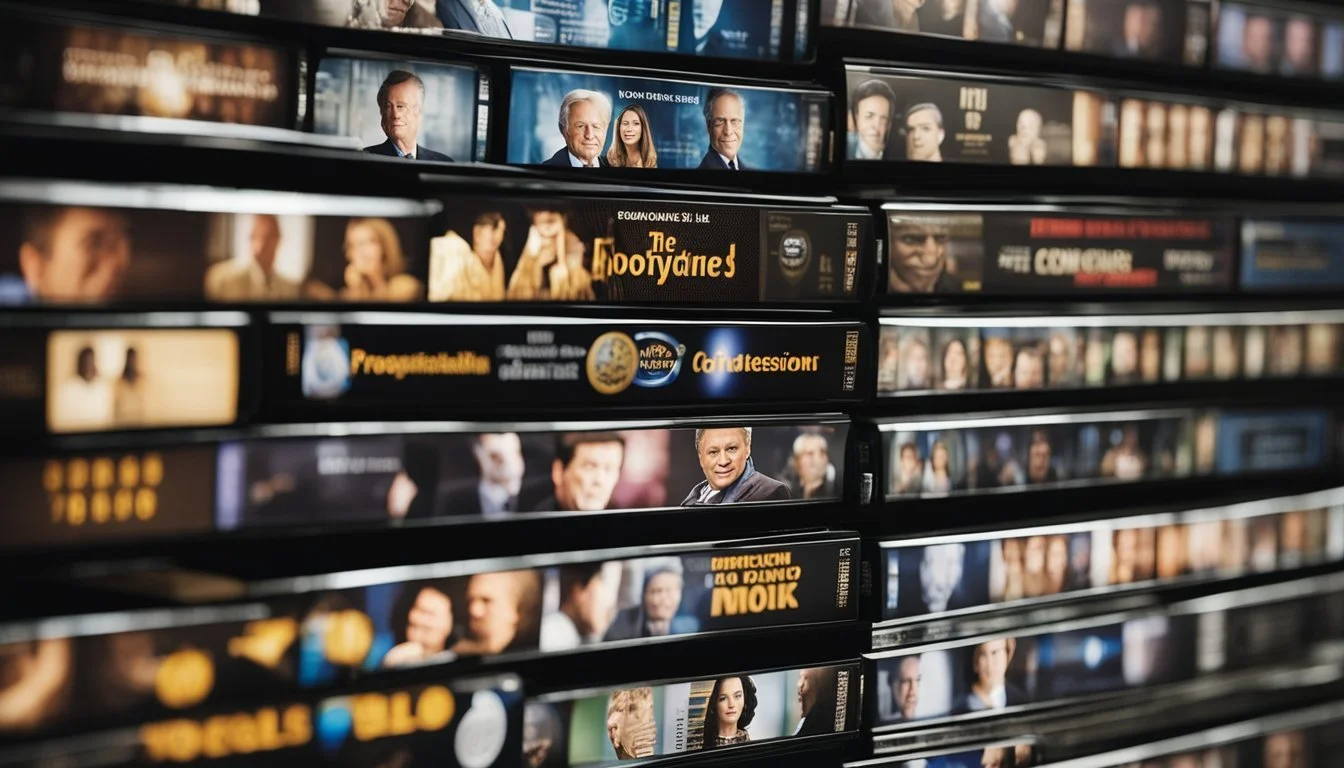10 Documentaries on Political Ideologies
Exploring Diverse Perspectives
Exploring political ideologies through documentaries provides a dynamic lens into the forces that shape societies and governance systems across the globe. Whether it's a deep dive into the ramifications of policies or a closer look at historical movements, these films offer invaluable insights into the political landscapes that influence daily lives.
For those looking to understand the complex interplay of ideas and power structures, documentaries on political ideologies are indispensable tools. By presenting real-life events and narratives, these films bridge the gap between theoretical knowledge and lived experience, making them essential viewing for anyone interested in the underpinnings of modern politics.
1) The Century of the Self (2002)
"The Century of the Self" is a British television documentary series made by Adam Curtis. The series examines the influence of psychoanalysts Sigmund Freud and Anna Freud, along with PR consultant Edward Bernays.
The documentary proposes that those in power have used Freud's theories to control the masses in the age of mass democracy. This theme is explored through a series of four episodes.
Each episode delves into different aspects of how psychological theories have been applied to politics and business to manipulate public perception and behavior.
Adam Curtis is known for his thought-provoking work, and "The Century of the Self" is no exception. It offers a deep dive into the ways in which psychoanalytic ideas have shaped the modern world.
For more information on this documentary, visit the Wikipedia page.
2) The Act of Killing (2012)
The Act of Killing is a groundbreaking documentary directed by Joshua Oppenheimer. It explores the 1965-66 mass killings in Indonesia through the eyes of the perpetrators.
The film features the former death squad leaders reenacting their real-life atrocities in various cinematic styles, including gangster, western, and musical genres. This approach brings a surreal and haunting perspective to historical horrors.
By focusing on the killers' perspectives, the documentary sheds light on the Indonesian government's involvement in the massacres. It highlights the normalization of violence and the perpetrators' ongoing influence in society.
The film's experimental nature and intense subject matter evoke strong emotional reactions. It challenges viewers to confront uncomfortable truths about human nature and historical memory.
Since its release, The Act of Killing has sparked widespread discussions about human rights and justice in Indonesia and worldwide. It received critical acclaim and was nominated for an Academy Award for Best Documentary Feature.
For more information, visit Wikipedia.
3) 13th (2016)
Ava DuVernay's documentary "13th" explores the intersection of race, justice, and mass incarceration in the United States. The title refers to the Thirteenth Amendment of the U.S. Constitution, which abolished slavery, except as punishment for a crime.
The film examines how this loophole has led to the disproportionate incarceration of Black Americans.
"13th" delves into historical and contemporary issues, connecting the past of slavery and Jim Crow laws to modern-day mass incarceration. It provides a comprehensive overview of systemic racism within the American justice system. Interviews with activists, scholars, and politicians enrich the narrative, offering multiple perspectives.
Available on Netflix, this documentary is notable for its detailed research and powerful storytelling. It sheds light on critical issues that continue to affect the United States. For those interested in understanding more about systemic racism and the criminal justice system, "13th" is a must-watch.
More information can be found here.
4) Winter on Fire: Ukraine’s Fight for Freedom (2015)
"Winter on Fire: Ukraine’s Fight for Freedom" offers a poignant look at the Euromaidan protests in Ukraine from November 2013 to February 2014. Directed by Evgeny Afineevsky, the documentary captures the transformation of the protests from peaceful demonstrations into a full-scale revolution.
The film highlights the sense of unity among diverse groups in Ukrainian society as they rallied against the government. Through personal stories and harrowing footage, it provides a ground-level view of the struggle for political change.
This documentary is notable for its eyewitness accounts and the raw intensity of its visual storytelling. It serves as an important record of the fight for democracy and human rights in Ukraine. For more information, visit IMDb.
5) The Fog of War (2003)
"The Fog of War: Eleven Lessons from the Life of Robert S. McNamara" is a documentary directed by Errol Morris. The film delves into the perspectives of Robert S. McNamara, former U.S. Secretary of Defense, as he reflects on the complexities and ethical ambiguities of modern warfare.
The documentary features an original score by Philip Glass. It captures McNamara's insights into pivotal events of the 20th century, including his role during the Vietnam War and the Cuban Missile Crisis.
Through McNamara's observations, the film explores the unintended consequences and moral dilemmas of military decisions. "The Fog of War" earned critical acclaim and was awarded the Academy Award for Best Documentary.
For more information, visit Wikipedia.
6) Triumph of the Will (1935)
"Triumph of the Will" is a German Nazi propaganda film directed, produced, edited, and co-written by Leni Riefenstahl. Adolf Hitler commissioned the film, and it chronicles the 1934 Nazi Party Congress held in Nuremberg. The event was attended by over 700,000 Nazi supporters.
The film is noted for its technical prowess, featuring innovative camera angles, tracking shots, and close-ups. These techniques convey a sense of grandeur and power. Riefenstahl's work in "Triumph of the Will" is seen as pioneering in the field of documentary filmmaking.
The film opens with dramatic aerial shots and classical music as Hitler descends from the sky, greeted by vast crowds. This sequence sets the tone for the film, portraying Hitler almost like a divine figure. It is a visually striking example of how film can be used to influence political ideology.
Despite its controversial content, the technical achievements of "Triumph of the Will" have influenced numerous filmmakers and remain a topic of study in film schools. The film serves as a potent reminder of how art and media can be manipulated to serve political ends.
For more information on "Triumph of the Will," check Wikipedia.
7) Requiem for the American Dream (2015)
"Requiem for the American Dream" centers on the thoughts of Noam Chomsky, a renowned linguist and political activist. The documentary discusses the concentration of wealth and power in the United States over the past fifty years, placing a spotlight on issues like income inequality and neoliberal policies.
Chomsky outlines ten principles that have shaped the current economic landscape. These principles aim to explain how wealth has increasingly accumulated in the hands of a few, at the expense of the broader population.
The film compiles interviews with Chomsky, where he provides historical context and discusses the societal impacts of these shifts. It was created by filmmakers Peter Hutchison, Kelly Nyks, and Jared P. Scott.
Suitable for those interested in understanding the deeper mechanisms behind economic policies and their social consequences, this documentary provides a critical view of American capitalism. It is available for viewing on multiple platforms and remains relevant for contemporary political discussions.
8) The Great Hack (2019)
The Great Hack explores the unsettling world of data exploitation. Centered around the Cambridge Analytica scandal, it examines how personal data was harvested and used to influence the 2016 U.S. presidential election.
The documentary provides insights into the operations of Cambridge Analytica, showing how the company manipulated voter behavior. This raises concerns about privacy and the power of social media.
The filmmakers, Karim Amer and Jehane Noujaim, offer access to key figures involved in the scandal. Their personal stories highlight the ethical implications of data misuse.
The Great Hack is an essential watch for those interested in the intersection of technology and politics. It underscored the significant consequences of data privacy breaches.
For more information, visit IMDb.
9) The Corporation (2004)
"The Corporation" offers a critical look at the nature and rise of corporations in modern society. Directed by Mark Achbar and Jennifer Abbott, and written by Joel Bakan, the documentary explores the legal status of corporations as "persons" and scrutinizes their behavior through that lens.
The film includes insights from CEOs, whistle-blowers, brokers, and other industry insiders. It examines both the positive and negative impacts of corporate power throughout history, making it a comprehensive investigation.
Reviewers have praised the documentary for its thought-provoking and informative content. It presents a balanced discussion on the influence of corporations, making it a must-watch for those interested in understanding corporate power and its societal implications.
For more information, visit Wikipedia.
10) How to Start a Revolution (2011)
This BAFTA Scotland Award-winning documentary spotlights the life and ideas of Gene Sharp, a notable political theorist and Nobel Peace Prize nominee.
The film explores Sharp’s theories on nonviolent revolution and their influence on global uprisings.
Released the day after the first Occupy Wall Street protests in New York, it quickly became associated with the Occupy movement. The film’s educational and inspirational content has resonated with activists worldwide.
For more details, visit Wikipedia.
Understanding Political Ideologies
Political ideologies shape societies by influencing policy decisions, social norms, and governance structures. They can range from liberalism to fascism, each with distinct principles and historical contexts.
Definition and Importance
Political ideologies are structured sets of beliefs about the best forms of government, economic systems, and social values. These ideologies guide political behavior, policymaking, and the organization of societies.
Understanding these ideologies is crucial as it helps citizens make informed decisions, fosters public debate, and contributes to political stability.
Major Types of Political Ideologies
Several major political ideologies have shaped modern history. Liberalism emphasizes individual freedoms, democracy, and market economies. Conservatism focuses on tradition, social stability, and gradual change.
Socialism advocates for economic equality and collective ownership of resources. Fascism promotes authoritarian governance, nationalism, and often racial superiority.
These ideologies differ in their views on the role of the state, individual rights, and societal goals, creating diverse political landscapes globally.
Historical Evolution
Political ideologies have evolved over centuries. Liberalism emerged during the Enlightenment, promoting reason and individual rights. Socialism grew in response to industrialization's inequalities, advocating for workers' rights and economic equity.
Fascism developed in the early 20th century, reacting against liberalism and socialism with a focus on centralized power and national unity.
Conservatism has its roots in a defense of traditional institutions against revolutionary changes. These historical shifts reflect the dynamic nature of political thought responding to social, economic, and political contexts.
Impact of Documentaries on Political Consciousness
Documentaries can significantly influence political consciousness by providing educational insights and shaping public opinion.
Educational Value
Documentaries often serve as powerful educational tools. They present complex political concepts in an accessible format, making it easier for viewers to grasp intricate subjects. For instance, "American Factory" sheds light on factory-driven politics and globalization, offering viewers a grounded understanding of these issues.
By featuring historical events, legislation, and political figures, documentaries contribute to political literacy. Films like "13th" explore the history of the 13th Amendment and its implications, providing critical context to contemporary discussions on race and justice in America.
Furthermore, documentaries often include expert interviews and firsthand accounts, adding depth and authenticity to the narrative. This combination of storytelling and factual information enhances viewers’ comprehension of political dynamics.
Shaping Public Opinion
Documentaries have the potential to shape public opinion by highlighting social injustices and political issues. They often challenge the status quo and prompt viewers to reevaluate their beliefs. For example, political films emphasize the need for social change, resonating with audiences who seek reform.
These films can also drive public discourse by bringing lesser-known issues into the spotlight. Documentaries like those featured in "15 Best Political Documentaries to Understand the World" raise awareness of global policies and their local impacts, fostering a more informed citizenry.
Moreover, the emotional and visual storytelling employed by documentaries can make political issues more relatable. By humanizing abstract concepts, documentaries engage viewers on a personal level, increasing empathy and motivating civic action.



